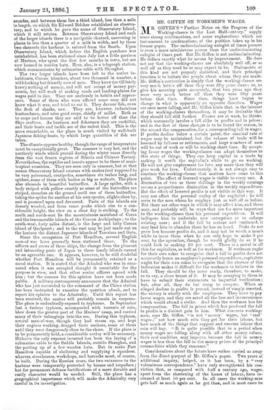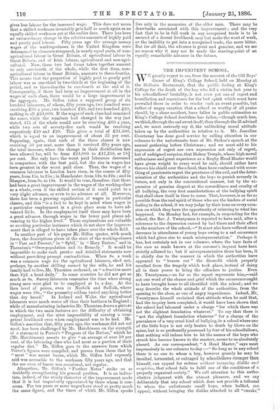MR. GIFFEN ON WORKMEN'S WAGES.
MR. GIFFEN'S " Further Notes on the Progress of the Working-classes in the Last Half-century," supply some strong confirmations, and some explanations which are tantamount to confirmations, of the position taken up in his former paper. The undiscriminating eulogist of times present is even a more mischievous person than the undiscriminating eulogist of times past. But Mr. Giffen is not undiscriminating. He defines exactly what he means by improvement. He does not say that the working-classes are absolutely well off, or as well off as they need be or may expect to be. Statements of this kind are not properly statistical, and their principal function is to irritate the people about whom they are made. Mr. Giffen's contention is simply that the working-classes are very much better off than they were fifty years since ; or, to give his meaning quite accurately, that two years ago they were very much better off than they were fifty years before that time. Since then, things have begun to change in what is apparently an opposite direction. Wages are once more falling, and Mr. Giffen hints that, in the interest of the working-classes themselves, it may be desirable that they should fall still further. Causes are at work, he thinks, which necessarily involve a fall alike in profits and in prices ; and in the first of these changes is to be found the reason, in the second the compensation, for a corresponding fall in wages. If profits decline below a certain point, the nominal rate of wages may be maintained, but the volume of trade will be lessened by failures or retirements, and large numbers of meta will be out of work or will be working short time. By accept- ing lower wages the working-classes can adapt themselves to this state of things. They can keep capital in a trade by making it worth the capitalist's while to go on working. He will not give employment for lore, any more than they will give work for love. Unfortunately, it is not always easy to convince the working-classes that matters have come to this point. The effect of lowered wages is visible to every one. A diminution of two or three shillings in the weekly earnings means a proportionate diminution in the weekly expenditure. But the effect of lowered profits is not visible in this way. It may not affect the personal outlay of the capitalist ; he will seem to the men whom he employs just as well off as before. But there are other ways in which it may affect him, and these may, and probably will, be ways that are far more important to the working-classes than his personal expenditure. It will indispose him to undertake new enterprises or to enlarge existing ones ; and if the fall be serious and continued, it may lead him to abandon those he has on hand. Risks do not grow less because profits do, and it may not be worth a man's while to incur them when he can only hope to make 3 per cent. by the operation, though he would gladly do so if he could look to making 10 per cent. There is a moral in all this for capitalists, as well as for workmen. If workmen ought for their own sakes to recognise that a fall in profits does not necessarily lessen an employer's personal expenditure, capitalists ought for their own sakes to recognise that the absence of this indication makes it difficult for the workmen to believe in the fall. They should be the more ready, therefore, to make, so to say, a clean breast of it. It may be annoying to them to have to submit their statements to impartial verification ; but, after all, they do but stoop to conquer. When an alleged decline in profits is proved, instead of simply asserted, the victory is wholly with the employers. They have to pay lower wages, and they are saved all the loss and inconvenience which would attend a strike. And then the workman has his compensation. The fall in prices which has produced the fall in profits is a distinct gain to him. What concerns working- men, says Mr. Giffen, "is not money' wages, but 'real' wages ;" not how much coin they get for their labour, but how much of the things that support and sweeten labour that coin will buy. " It is quite possible that in a period when money wages are falling, along with all other money values, their real condition may improve, because the fall in money wages is less than the fall in the money prices of the principal commodities which they consume."
Considerations about the future have rather carried us away from the direct purport of Mr. Giffen's paper. Two years of additional inquiry, helped, as it has been, by a " very voluminous correspondence," have only strengthened his con- viction that, as compared with half a century ago, wages, apart from the shortening of the hours of labour, have in- creased at least 50 per cent. In all cases the working-man gets half as much again as he got then, and in most cases he gives less labour for the increased wage. This does not mean that a skilled workman invariably gets half as much again as an equally skilled workman got at the earlier date. There has been an extraordinary change in the relative amounts of highly paid and poorly paid labour. Fifty years ago the average money wages of the working-classes in the United Kingdom were determined by elements composed, in nearly equal parts, of non- agricultural labour in Great Britain, of agricultural labour in Great Britain, and of Irish labour, agricultural and non-agri- cultural. Now, these two last items taken together amount to only one-fourth of the whole, while the first item, non- agricultural labour in Great Britain, amounts to three-fourths. This means that the proportion of highly paid to poorly paid labour was as one-third to two-thirds at the beginning of the period, and as three-fourths to one-fourth at the end of it. Consequently, if there had been no improvement at all in the wages of each class, there would be a large improvement in the aggregate. Mr. Giffen takes a supposed group of six hundred labourers, of whom, fifty years ago, two hundred were receiving £60 a year, two hundred £40, and two hundred £20, making in all £24,000. If the wages of each class had remained the same, while the numbers had changed in the way just stated, 475 of the whole would now be receiving £60 a year, while two sets of seventy-five each would be receiving respectively £40 and £20. This gives a total of £31,500, which is equal to an improvement of about 33 per cent. Supposing, again, that each of the three classes is now receiving 50 per cent. more than it received fifty years ago, the total increase, when the change in their distribution has been allowed for, will be from £24,000 to £47,250, or 78i per cent. Not only have the worst paid labourers decreased in comparison with the best paid, but the rise in wages has been greatest in the wcrst paid class. Thus, the wages of a common labourer in London have risen, in the course of fifty years, from 15s. to 25s. ; in Manchester, from 12s. to 22s. ; and in .Glasgow, from Os. to 18s. It would be true, therefore, that there had been a great improvement in the wages of the working-class as a whole, even if the skilled section of it could point to a very slight advance, or even to no advance at all. Moreover, there has been a growing equalisation of wages in particular classes, and this " is a fact to be kept in mind when wages in a particular employment in a given place seem to have ad- vanced little. In the employment itself there may have been a great advance, through wages in the lower paid places ad- vancing to the higher level." These explanations are valuable as meeting particular instances which do not show the improve- ment that is alleged to have taken place over the whole field.
In another part of his paper Mr. Giffen quotes, with much force, the descriptions given of the state of the working-classes in "Past and Present," in " Sybil," in •' Mary Barton," and in Thornton's "Over-population and its Remedy." It would be impossible to make such precise and detailed statements now without provoking prompt contradiction. When 8s. a week was a common wage for the agricultural labourer, eked out, perhaps, by another shilling earned by the wife, he and his family had to live, Mr. Thornton reckoned, on " a fraction more than 2id. a head daily." In some counties he did not get so much as 8s. Surrey labourers remember the time when strong young men were glad to be employed at ls. a day. At the then level of prices, even in Norfolk and Suffolk, where wages were 10s., " the peasantry seldom tasted anything better
than dry bread." In Ireland and Wales, the agricultural labourers were much worse off than their brethren in England ; while of manufacturing industries Mr. Thornton draws a picture in which the two main features are the difficulty of obtaining employment, and the utter impossibility of earning a com- petent livelihood even when employment was to be had. Mr. Giffen's assertion that, fifty years ago, the workman did not eat meat, has been challenged by Mr. Hutchinson on the strength of a statement in Porter's "Progress of the Nation," which he (Mr. Hutchinson) asserts to give " an average of over 50 per cent. of the labouring class who had meat as a portion of their regular diet." Mr. Giffen goes to the answers from which Porter's figures were compiled, and proves from them that by " meat " was meant bacon, which Mr. Giffen had expressly said was accessible to the workman fifty years ago, and that the use even of bacon was occasional, not regular. Altogether, Mr. Giffen's "Further Notes" strike us as decidedly strengthening his general position. It is an indica- tion, indeed, of the steady character of the improvement made 'that it is but imperfectly appreciated by those whom it con- cerns. For ten years or more wages have stood at pretty much the same figure, and the times of which Mr. Giffen speaks
live only in the memories of the older men. There may be drawbacks associated with this improvement ; and the very fact that to be in full work in any recognised trade is to be assured of a decent livelihood, may but make the want of work, or the inability to get into a recognised trade, the more bitter. But for all that, the advance is great and genuine, and we see no reason why it may not be made the starting-point of an equally remarkable advance in the future.



































 Previous page
Previous page